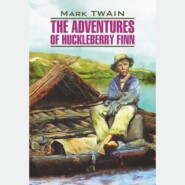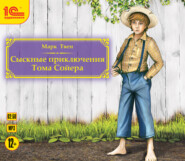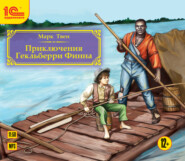По всем вопросам обращайтесь на: info@litportal.ru
(©) 2003-2025.
✖
The Prince and the Pauper
Настройки чтения
Размер шрифта
Высота строк
Поля
“Mind thy tongue, thou mad fool, and speak not our name. I will choose me a new name, speedily, to throw the law’s dogs off the scent. Mind thy tongue, I tell thee!”
He growled these words to the rest of the family —
“If it so chance that we be separated, let each make for London Bridge; whoso findeth himself as far as the last linen-draper’s shop on the bridge, let him tarry there till the others be come, then will we flee into Southwark together.”
At this moment the party burst suddenly out of darkness into light; and not only into light, but into the midst of a multitude of singing, dancing, and shouting people, massed together on the river frontage. There was a line of bonfires stretching as far as one could see, up and down the Thames; London Bridge was illuminated; Southwark Bridge likewise; the entire river was aglow with the flash and sheen of coloured lights; and constant explosions of fireworks filled the skies with an intricate commingling of shooting splendours and a thick rain of dazzling sparks that almost turned night into day; everywhere were crowds of revellers; all London seemed to be at large.
John Canty delivered himself of a furious curse and commanded a retreat; but it was too late. He and his tribe were swallowed up in that swarming hive of humanity, and hopelessly separated from each other in an instant. We are not considering that the Prince was one of his tribe; Canty still kept his grip upon him. The Prince’s heart was beating high with hopes of escape, now. A burly waterman, considerably exalted with liquor, found himself rudely shoved by Canty in his efforts to plough through the crowd; he laid his great hand on Canty’s shoulder and said —
“Nay, whither so fast, friend? Dost canker thy soul with sordid business when all that be leal men and true make holiday?”
“Mine affairs are mine own, they concern thee not,” answered Canty, roughly; “take away thy hand and let me pass.”
“Sith that is thy humour, thou’lt not pass, till thou’st drunk to the Prince of Wales, I tell thee that,” said the waterman, barring the way resolutely.
“Give me the cup, then, and make speed, make speed!”
Other revellers were interested by this time. They cried out —
“The loving-cup, the loving-cup! make the sour knave drink the loving-cup, else will we feed him to the fishes.”
So a huge loving-cup was brought; the waterman, grasping it by one of its handles, and with the other hand bearing up the end of an imaginary napkin, presented it in due and ancient form to Canty, who had to grasp the opposite handle with one of his hands and take off the lid with the other, according to ancient custom. This left the Prince hand-free for a second, of course. He wasted no time, but dived among the forest of legs about him and disappeared. In another moment he could not have been harder to find, under that tossing sea of life, if its billows had been the Atlantic’s and he a lost sixpence.
He very soon realised this fact, and straightway busied himself about his own affairs without further thought of John Canty. He quickly realised another thing, too. To wit, that a spurious Prince of Wales was being feasted by the city in his stead. He easily concluded that the pauper lad, Tom Canty, had deliberately taken advantage of his stupendous opportunity and become a usurper.
Therefore there was but one course to pursue – find his way to the Guildhall, make himself known, and denounce the impostor. He also made up his mind that Tom should be allowed a reasonable time for spiritual preparation, and then be hanged, drawn and quartered, according to the law and usage of the day in cases of high treason.
Chapter XI. At Guildhall
The royal barge, attended by its gorgeous fleet, took its stately way down the Thames through the wilderness of illuminated boats. The air was laden with music; the river banks were beruffled with joy-flames; the distant city lay in a soft luminous glow from its countless invisible bonfires; above it rose many a slender spire into the sky, incrusted with sparkling lights, wherefore in their remoteness they seemed like jewelled lances thrust aloft; as the fleet swept along, it was greeted from the banks with a continuous hoarse roar of cheers and the ceaseless flash and boom of artillery.
To Tom Canty, half buried in his silken cushions, these sounds and this spectacle were a wonder unspeakably sublime and astonishing. To his little friends at his side, the Princess Elizabeth and the Lady Jane Grey, they were nothing.
Arrived at the Dowgate, the fleet was towed up the limpid Walbrook (whose channel has now been for two centuries buried out of sight under acres of buildings) to Bucklersbury, past houses and under bridges populous with merry-makers and brilliantly lighted, and at last came to a halt in a basin where now is Barge Yard, in the centre of the ancient city of London. Tom disembarked, and he and his gallant procession crossed Cheapside and made a short march through the Old Jewry and Basinghall Street to the Guildhall.
Tom and his little ladies were received with due ceremony by the Lord Mayor and the Fathers of the City, in their gold chains and scarlet robes of state, and conducted to a rich canopy of state at the head of the great hall, preceded by heralds making proclamation, and by the Mace and the City Sword. The lords and ladies who were to attend upon Tom and his two small friends took their places behind their chairs.
At a lower table the Court grandees and other guests of noble degree were seated, with the magnates of the city; the commoners took places at a multitude of tables on the main floor of the hall. From their lofty vantage-ground the giants Gog and Magog, the ancient guardians of the city, contemplated the spectacle below them with eyes grown familiar to it in forgotten generations. There was a bugle-blast and a proclamation, and a fat butler appeared in a high perch in the leftward wall, followed by his servitors bearing with impressive solemnity a royal baron of beef, smoking hot and ready for the knife.
After grace, Tom (being instructed) rose – and the whole house with him – and drank from a portly golden loving-cup with the Princess Elizabeth; from her it passed to the Lady Jane, and then traversed the general assemblage. So the banquet began.
By midnight the revelry was at its height. Now came one of those picturesque spectacles so admired in that old day. A description of it is still extant in the quaint wording of a chronicler who witnessed it:
‘Space being made, presently entered a baron and an earl appareled after the Turkish fashion in long robes of bawdkin powdered with gold; hats on their heads of crimson velvet, with great rolls of gold, girded with two swords, called scimitars, hanging by great bawdricks of gold. Next came yet another baron and another earl, in two long gowns of yellow satin, traversed with white satin, and in every bend of white was a bend of crimson satin, after the fashion of Russia, with furred hats of gray on their heads; either of them having an hatchet in their hands, and boots with pykes’ (points a foot long), ‘turned up. And after them came a knight, then the Lord High Admiral, and with him five nobles, in doublets of crimson velvet, voyded low on the back and before to the cannell-bone, laced on the breasts with chains of silver; and over that, short cloaks of crimson satin, and on their heads hats after the dancers’ fashion, with pheasants’ feathers in them. These were appareled after the fashion of Prussia. The torchbearers, which were about an hundred, were appareled in crimson satin and green, like Moors, their faces black. Next came in a mommarye. Then the minstrels, which were disguised, danced; and the lords and ladies did wildly dance also, that it was a pleasure to behold.’
And while Tom, in his high seat, was gazing upon this ‘wild’ dancing, lost in admiration of the dazzling commingling of kaleidoscopic colours which the whirling turmoil of gaudy figures below him presented, the ragged but real little Prince of Wales was proclaiming his rights and his wrongs, denouncing the impostor, and clamouring for admission at the gates of Guildhall! The crowd enjoyed this episode prodigiously, and pressed forward and craned their necks to see the small rioter. Presently they began to taunt him and mock at him, purposely to goad him into a higher and still more entertaining fury. Tears of mortification sprang to his eyes, but he stood his ground and defied the mob right royally. Other taunts followed, added mockings stung him, and he exclaimed —
“I tell ye again, you pack of unmannerly curs, I am the Prince of Wales! And all forlorn and friendless as I be, with none to give me word of grace or help me in my need, yet will not I be driven from my ground, but will maintain it!”
“Though thou be prince or no prince, ‘tis all one, thou be’st a gallant lad, and not friendless neither! Here stand I by thy side to prove it; and mind I tell thee thou might’st have a worser friend than Miles Hendon and yet not tire thy legs with seeking. Rest thy small jaw, my child; I talk the language of these base kennel-rats like to a very native.”
The speaker was a sort of Don Caesar de Bazan in dress, aspect, and bearing. He was tall, trim-built, muscular. His doublet and trunks were of rich material, but faded and threadbare, and their gold-lace adornments were sadly tarnished; his ruff was rumpled and damaged; the plume in his slouched hat was broken and had a bedraggled and disreputable look; at his side he wore a long rapier in a rusty iron sheath; his swaggering carriage marked him at once as a ruffler of the camp. The speech of this fantastic figure was received with an explosion of jeers and laughter. Some cried, “‘Tis another prince in disguise!” “‘Ware thy tongue, friend: belike he is dangerous!” "Marry, he looketh it – mark his eye!” "Pluck the lad from him – to the horse-pond wi’ the cub!”
Instantly a hand was laid upon the Prince, under the impulse of this happy thought; as instantly the stranger’s long sword was out and the meddler went to the earth under a sounding thump with the flat of it. The next moment a score of voices shouted, “Kill the dog! Kill him! Kill him!” and the mob closed in on the warrior, who backed himself against a wall and began to lay about him with his long weapon like a madman. His victims sprawled this way and that, but the mob-tide poured over their prostrate forms and dashed itself against the champion with undiminished fury.
His moments seemed numbered, his destruction certain, when suddenly a trumpet-blast sounded, a voice shouted, “Way for the King’s messenger!” and a troop of horsemen came charging down upon the mob, who fled out of harm’s reach as fast as their legs could carry them. The bold stranger caught up the Prince in his arms, and was soon far away from danger and the multitude.
Return we within the Guildhall. Suddenly, high above the jubilant roar and thunder of the revel, broke the clear peal of a bugle-note. There was instant silence – a deep hush; then a single voice rose – that of the messenger from the palace – and began to pipe forth a proclamation, the whole multitude standing listening.
The closing words, solemnly pronounced, were —
“The King is dead!”
The great assemblage bent their heads upon their breasts with one accord; remained so, in profound silence, a few moments; then all sank upon their knees in a body, stretched out their hands toward Tom, and a mighty shout burst forth that seemed to shake the building —
“Long live the King!”
Poor Tom’s dazed eyes wandered abroad over this stupefying spectacle, and finally rested dreamily upon the kneeling princesses beside him, a moment, then upon the Earl of Hertford. A sudden purpose dawned in his face. He said, in a low tone, at Lord Hertford’s ear —
“Answer me truly, on thy faith and honour! Uttered I here a command, the which none but a king might hold privilege and prerogative to utter, would such commandment be obeyed, and none rise up to say me nay?”
“None, my liege, in all these realms. In thy person bides the majesty of England. Thou art the king – thy word is law.”
Tom responded, in a strong, earnest voice, and with great animation —
“Then shall the king’s law be law of mercy, from this day, and never more be law of blood! Up from thy knees and away! To the Tower, and say the King decrees the Duke of Norfolk shall not die!”
The words were caught up and carried eagerly from lip to lip far and wide over the hall, and as Hertford hurried from the presence, another prodigious shout burst forth —
“The reign of blood is ended! Long live Edward, King of England!”
Chapter XII. The Prince and his Deliverer
As soon as Miles Hendon and the little prince were clear of the mob, they struck down through back lanes and alleys toward the river. Their way was unobstructed until they approached London Bridge; then they ploughed into the multitude again, Hendon keeping a fast grip upon the Prince’s – no, the King’s – wrist. The tremendous news was already abroad, and the boy learned it from a thousand voices at once – “The King is dead!” The tidings struck a chill to the heart of the poor little waif, and sent a shudder through his frame. He realised the greatness of his loss, and was filled with a bitter grief; for the grim tyrant who had been such a terror to others had always been gentle with him. The tears sprang to his eyes and blurred all objects. For an instant he felt himself the most forlorn, outcast, and forsaken of God’s creatures – then another cry shook the night with its far-reaching thunders: "Long live King Edward the Sixth!” and this made his eyes kindle, and thrilled him with pride to his fingers’ ends. “Ah,” he thought, “how grand and strange it seems —I am King!”
Our friends threaded their way slowly through the throngs upon the bridge. This structure, which had stood for six hundred years, and had been a noisy and populous thoroughfare all that time, was a curious affair, for a closely packed rank of stores and shops, with family quarters overhead, stretched along both sides of it, from one bank of the river to the other. The Bridge was a sort of town to itself; it had its inn, its beer-houses, its bakeries, its haberdasheries, its food markets, its manufacturing industries, and even its church. It looked upon the two neighbours which it linked together – London and Southwark – as being well enough as suburbs, but not otherwise particularly important. It was a close corporation, so to speak; it was a narrow town, of a single street a fifth of a mile long, its population was but a village population and everybody in it knew all his fellow-townsmen intimately, and had known their fathers and mothers before them – and all their little family affairs into the bargain. It had its aristocracy, of course – its fine old families of butchers, and bakers, and what-not, who had occupied the same old premises for five or six hundred years, and knew the great history of the Bridge from beginning to end, and all its strange legends; and who always talked bridgy talk, and thought bridgy thoughts, and lied in a long, level, direct, substantial bridgy way. It was just the sort of population to be narrow and ignorant and self-conceited. Children were born on the Bridge, were reared there, grew to old age, and finally died without ever having set a foot upon any part of the world but London Bridge alone. Such people would naturally imagine that the mighty and interminable procession which moved through its street night and day, with its confused roar of shouts and cries, its neighings and bellowing and bleatings and its muffled thunder-tramp, was the one great thing in this world, and themselves somehow the proprietors of it. And so they were, in effect – at least they could exhibit it from their windows, and did – for a consideration – whenever a returning king or hero gave it a fleeting splendour, for there was no place like it for affording a long, straight, uninterrupted view of marching columns.
Men born and reared upon the Bridge found life unendurably dull and inane elsewhere. History tells of one of these who left the Bridge at the age of seventy-one and retired to the country. But he could only fret and toss in his bed; he could not go to sleep, the deep stillness was so painful, so awful, so oppressive. When he was worn out with it, at last, he fled back to his old home, a lean and haggard spectre, and fell peacefully to rest and pleasant dreams under the lulling music of the lashing waters and the boom and crash and thunder of London Bridge.
In the times of which we are writing, the Bridge furnished ‘object lessons’ in English history for its children – namely, the livid and decaying heads of renowned men impaled upon iron spikes atop of its gateways. But we digress.
Hendon’s lodgings were in the little inn on the Bridge. As he neared the door with his small friend, a rough voice said —
“So, thou’rt come at last! Thou’lt not escape again, I warrant thee; and if pounding thy bones to a pudding can teach thee somewhat, thou’lt not keep us waiting another time, mayhap,” – and John Canty put out his hand to seize the boy.
Miles Hendon stepped in the way and said —
“Not too fast, friend. Thou art needlessly rough, methinks. What is the lad to thee?”

















